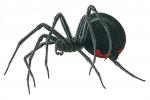Spiders
Black Widow Spider
| Appearance |
|---|
 Glossy black, often with red "hourglass" on back. May also be dark or light brown. 3/4-inch length, 3/8-inch diameter. Glossy black, often with red "hourglass" on back. May also be dark or light brown. 3/4-inch length, 3/8-inch diameter. |
| Habitat |
| They are found in all 50 states and often live around wood piles, gaining entry to structures when firewood is carried inside. Black widows spin their webs near ground level in protected areas such as cluttered garages, outhouses, and stacks of firewood. These webs are almost always constructed in hidden locations, including among piled items, beneath boards, in firewood, and between boxes. The black widow is widely feared because its bite causes severe pain that may take several days to subside. While bites are rarely fatal, small children and elderly individuals are at higher risk, making spider control important if black widows are suspected. |
| Diet |
| Black widows eat any insect they can capture. They paralyze or kill their prey with venom, then inject a fluid that enables them to suck out the digested liquid food. They can survive without food for several weeks to a few months. |
| Control |
| Bites can be avoided by wearing heavy gloves when moving items stored for long periods outdoors or in garages, basements, or warehouses. Shoes should be stored inside shoe boxes or shaken vigorously before wearing. Always carefully inspect before placing your hand under an object such as a log or rock. Professionals can remove spider infestations using a shop vacuum and apply spider control materials to help prevent their return. |









